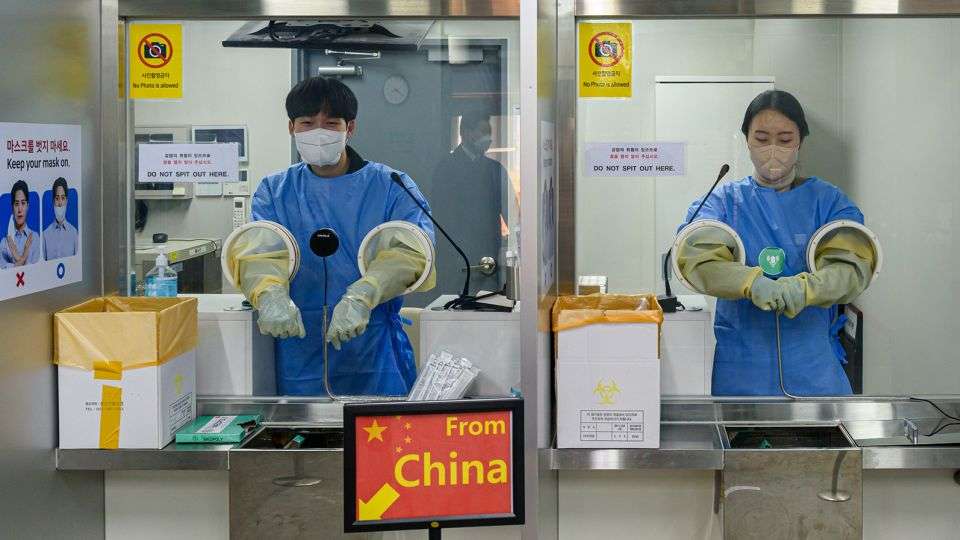In what seems an apparent retaliation for COVID-19 testing requirements imposed by South Korea on Chinese travelers, China has ceased issuing visas for South Koreans to come to the country for tourism or business.
Japanese media disclosed that the ban would also affect Japanese travelers.
A Japanese Foreign Ministry official noted that the government was aware of the report and was holding unofficial discussions with Chinese authorities about measures being considered by Beijing.
Speaking on customary condition of anonymity, the official intoned, it would be “regrettable” if restrictions are imposed.
The brief notice, published on the embassy WeChat account, said the ban will continue until South Korea lifts its “discriminatory measures on entrance by China” to the country.
“Visas for business, tourism, medical treatment, transit and general private affairs will be suspended for South Korean citizens effective today.”
Chinese Embassy in Seoul
The measures will be “adjusted” if South Korea cancels its “discriminatory” entry restrictions on China, the embassy added.
No other details were given, although China has threatened to retaliate against countries that require travelers from China to show a negative test result for COVID-19 taken within the previous 48 hours.
The announcement appeared to apply only to new applicants, and said nothing about South Koreans currently holding visas.
According to a readout from the Chinese side, China’s decision follows a Monday phone call between Foreign Minister Qin Gang and his South Korean counterpart Park Jin, during which Qin “expressed concern” over the restrictions and urged Seoul to take an “objective and scientific” approach.
Last week, South Korea stopped issuing tourist visas for those coming from China, which the Chinese foreign ministry called “unacceptable” and “unscientific”.
South Korea’s Decision Based On Scientific And Objective Evidence
South Korea’s Foreign Ministry disclosed in a statement that “Our government’s step to strengthen anti-virus measures on passengers arriving from China is based on scientific and objective evidence. We have provided information to the international community in a transparent manner and we have communicated with the Chinese side in advance.”
According to South Korea’s Disease Control and Prevention Agency, around a third of all arrivals from China tested positive for COVID prior to the visa restrictions being put in place.

At Seoul’s Incheon International airport, the only South Korean airport still allowing flights from China, arrivals are met by military personnel in personal protective equipment.
China’s withholding of visas from South Korean or Japanese businesspeople could delay the revival of fully fledged commercial activity and potential new investments following China’s abrupt lifting of anti-virus controls.
Around a dozen countries have followed the U.S. in requiring negative tests for travelers coming from China, which has lifted most of its “zero-COVID” restrictions but also has been experiencing a major outbreak since last month.
China’s move is grounded in its demands that its citizens be treated the same as those of other countries.
At a daily briefing, Foreign Ministry Spokesperson, Wang Wenbin defended China’s anti-pandemic measures, adding that “Regrettably, a handful of countries, in disregard of science and facts and the reality at home, have insisted on taking discriminatory entry restriction measures targeting China. China firmly rejected this and took reciprocal measures.”
The online notice at the embassy in Seoul did not say why China singled out South Korea for retaliation, although President and Communist Party leader, Xi Jinping’s deeply nationalistic government has long disliked Seoul’s alliance with the U.S.
China’s ambassador to Australia, Xiao Qian said the response of other nations to China’s COVID-19 outbreak has not been proportionate or constructive.
“Entry restrictions, if they’re targeted at China, they’re unnecessary,” the ambassador opined. He said countries should use a science-based response.
READ ALSO: It Does Appear Meek Mill’s Multiple Apologies To Ghanaians Are Quite Sincere- Ablakwa




















